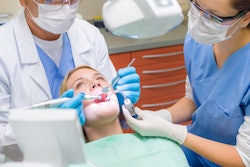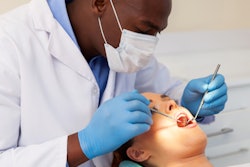
About seven out of 10 adults and nearly nine out of 10 children visited their dentists during 2020 despite the challenges COVID-19 posed, according to Delta Dental Plans Association's 2020 report on the state of America's oral health released on April 30.
Clinicians should use this data to help ensure that broader healthcare conversations include oral health, and its role in good physical, mental, and emotional wellbeing, said James Hutchison, Delta Dental Plans Association president and CEO, in the report.
"The more Americans know about the impact of oral health on overall health, the more likely they are to approach their health holistically," Hutchison said.
The hurdles brought on by the pandemic did not prevent people in the U.S. from prioritizing oral health during 2020, according to the report, which is based on two surveys that included about 2,000 adults and parents of children ages 12 and younger. The association conducted the survey between December 28, 2020, and January 8, 2021.
Of those adults who participated in the survey, 74% reported visiting dentists. Parents reported that 88% of children visited dentists during 2020, the report showed.
Furthermore, Delta Dental Plans Association expects oral care to be prioritized in the future. In 2021, 93% of participants reported they plan to visit the dentist. Most people also plan to secure dental insurance if they do not already have it and pay closer attention to their oral care habits at home, according to the report.
Keeping them safe, healthy
Of the adults surveyed, 90% believe that maintaining their oral health has been vital to protecting their overall health throughout the pandemic. Meanwhile, 94% of parents believe keeping up with good oral health protected their children during COVID-19.
Nevertheless, while 93% of adults and 96% of parents reported that oral health was very or extremely important to overall health, only one in two people knew that oral care was linked closely to other medical conditions, such as strokes, high blood pressure, diabetes, and dementia.
Though the report provides new insights into the greater public awareness of the connections between oral health and overall health, more work remains to be done. Clinicians need to capitalize on this opportunity and further educate the public about the connection, Hutchison said in the report.
"We are in a new era of healthcare, and as American society reexamines its healthcare practices in the wake of the pandemic, the oral health community must redouble its efforts to demonstrate the importance of oral health, partner with communities, and expand access to care," he concluded.




















